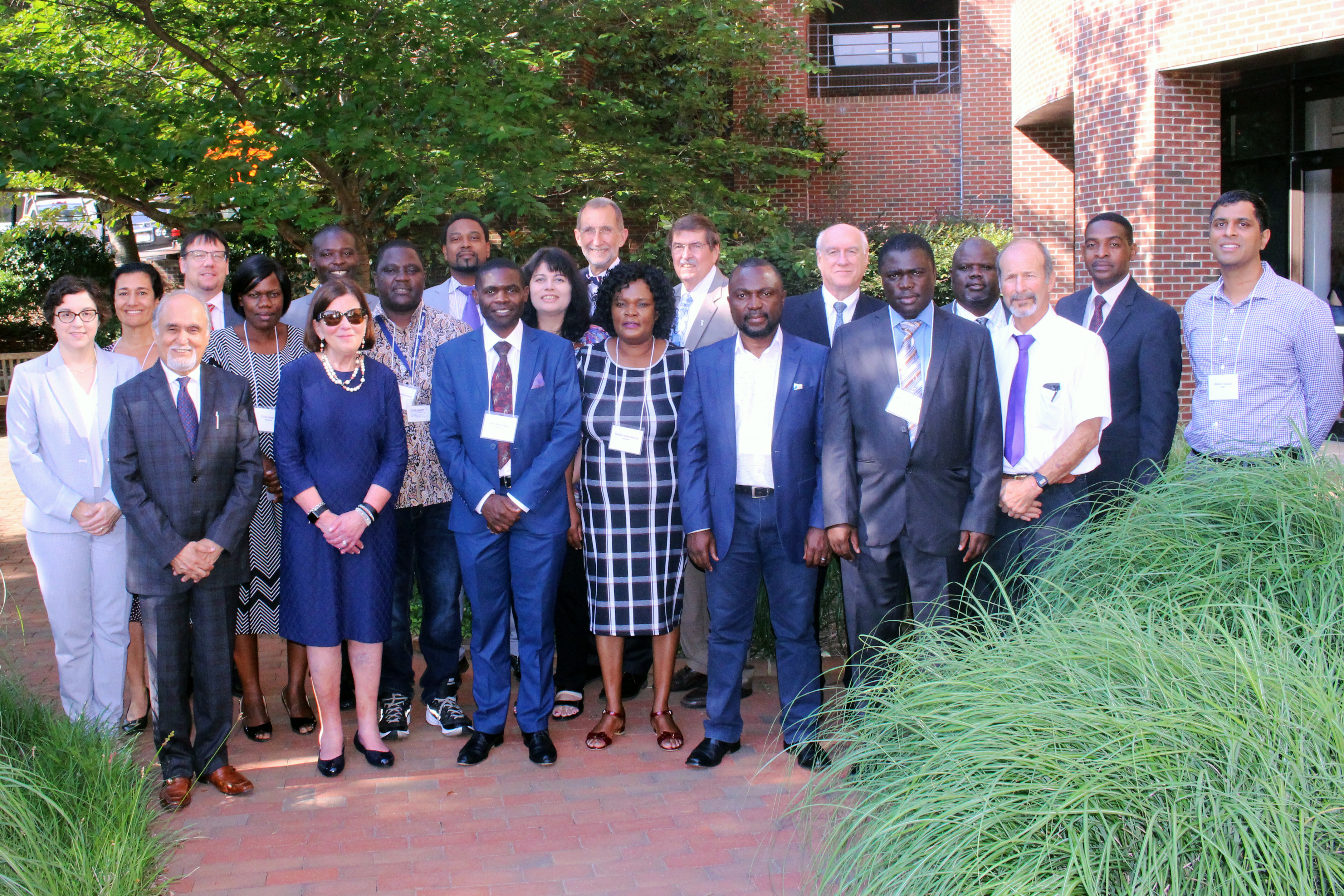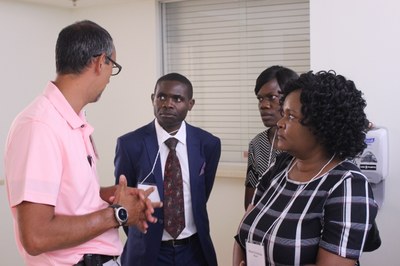

Health leaders from Malawi traveled to the University of North Carolina Lineberger Comprehensive Cancer Center last week to strengthen a longstanding research and health care partnership with UNC in advance of the opening of Malawi’s first dedicated cancer center.
The delegation from Malawi, including Principal Secretary for Health Dan Namarika, MBBS, the second highest ranking official at the Malawi Ministry of Health, met with health and university leaders, researchers and clinical staff across three days. They toured UNC Lineberger’s research facilities and the N.C. Cancer Hospital, where they learned about patient flow, equipment, costs of care and staffing. They also visited other medical facilities and laboratories, and met with researchers from a range of medical disciplines.
“We hope this cancer center should be ready by the end of the year,” Namarika said. “In terms of operationalization, that’s why this team is here … to learn from you.”
Amid a growing cancer burden, the Malawi Ministry of Health is expected to complete its first cancer center this year. A key goal is to provide radiation treatment in Malawi for the first time. While patients can undergo surgery and receive chemotherapy in Malawi, they must travel to India for radiation. Namarika said patients needing radiation are selected by committee, and when funding runs out for the year, the patients must wait until funding is available.
“I wanted to see this happen during my lifetime … (we are) realizing that dream,” he said. “For Malawians, this is something they’ve been wanting for as long as the country has existed. It’s the first of its kind in the country and our population is 18 million.”
UNC Lineberger physicians and researchers have been collaborating with Malawian health leaders to improve clinical care and to conduct cancer research in the country as part of UNC Project-Malawi, a collaboration launched in 1990 to help with HIV management. As HIV survival rates have improved, and due to other factors, cancer has emerged as a growing health problem in the country. In 2014, the Malawi Cancer Consortium was launched with funding from the National Cancer Institute to help fight cancer, and AIDS-linked cancers in particular.
“We are deeply proud of this 25-year, now headed towards 30-year partnership,” said UNC Health Care CEO William Roper, MD, MPH, dean of the UNC School of Medicine and vice chancellor for medical affairs for UNC-Chapel Hill. “It’s a major part of what we’re about, what we do; we are very proud of it. We are doing this not simply because this is the right thing, the humanitarian thing, the good thing to do. We reap substantial benefits from the training, the research, the care opportunities that you allow us to have when we are there in Malawi, and (from the) exchanges that occur back and forth. This is a mutually beneficial partnership.”
Malawian leaders discussed their goals for the cancer center and for their national cancer prevention plan in a meeting with Roper; UNC Lineberger Director H. Shelton Earp, MD; UNC-Chapel Hill Chancellor Carol Folt, ScD; UNC Gillings School of Global Public Health Dean Barbara Rimer, DrPH; Dhiren Thakker, PhD, interim dean of the UNC Eshelman School of Pharmacy; Irving Hoffman, PA, MPH, international director for UNC Project-Malawi; Myron Cohen, MD, associate vice chancellor for global health at UNC-Chapel Hill and director of the Institute for Global Health & Infectious Diseases; and Blossom Damania, PhD, vice dean for research at the UNC School of Medicine and co-director of the UNC Lineberger global oncology program.
Namarika said with the cancer center’s opening, they want to ensure that the quality of care is maintained as they increase access to health care. He also said they will face rising costs as they see more patients. As the N.C. Cancer Hospital has tripled the number of new patients in the last decade, Earp said UNC leaders have grappled with similar issues of growth. He emphasized the importance of research to improve care there, and in North Carolina.
“UNC Project-Malawi set the stage for top flight research in Malawi,” Earp said. “This has allowed UNC faculty, students and the Kamazu Central Hospital physicians, staff and students to partner for a deeper understanding of cancer causation and care. Our research efforts were strengthened by this visit from the leaders of hospital administration, oncology, surgery, pathology, pharmacy and radiology as they get ready to open their wonderful new cancer hospital.”
Folt said it was a privilege to welcome the delegation. Last year, she traveled to Malawi to mark the opening of a new building for UNC Project-Malawi, a trip that she called one of her most moving and rewarding. She emphasized that the collaboration is about research as well as training, education and clinical care.
“This project is something that the university is very proud of,” Folt said. “Everything we do, every dollar that we raise, everything we try to bring to life here is about making lives better for people and doing innovation for the public good,” she also said. “Working with partners is really critical to us and reinforces our commitment to a global mindset and being a global partner.”
Through training the next generation, as well as conducting research, UNC Lineberger is working to make lasting changes to improve cancer care in Malawi, said UNC Lineberger’s Dirk Dittmer, PhD, professor in the UNC School of Medicine Department of Microbiology and Immunology and the co-director of the UNC Lineberger global oncology program.
“It’s a working relationship of equal partners– that’s perhaps the biggest expression of them coming here,” Dittmer said. “It is elevated out of (infectious disease), out of the cancer center into a bigger issue for the university and a focus point for the School Of Medicine.”
UNC Lineberger’s Satish Gopal, MD, MPH, cancer program director for UNC Project-Malawi and an associate professor in the UNC School of Medicine and UNC Gillings School of Global Public Health, said the opening of the center will be a milestone event for Malawi.
“There will be a lot of publicity about the center, and broader recognition about what cancer is, and about the importance of coming early for diagnosis and treatment,” he said. “It will be a big cultural milestone where we will see patient volumes go up. We are excited to continue working with our Malawi partners to really impact this critical public health problem in this part of the world.”
